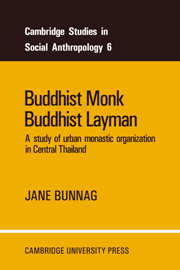Book contents
- Frontmatter
- Contents
- List of tables
- List of illustrations
- Preface
- Map A Thailand
- Introduction: the Thai social system
- 1 ‘The way of the monk’
- 2 The monk and the lay community
- 3 The wat community
- 4 The wat and its social matrix
- 5 The role of the Buddhist layman
- 6 The loosely structured social system: red herring or rara avis?
- Appendixes
- Bibliography
- Index
5 - The role of the Buddhist layman
Published online by Cambridge University Press: 06 January 2010
- Frontmatter
- Contents
- List of tables
- List of illustrations
- Preface
- Map A Thailand
- Introduction: the Thai social system
- 1 ‘The way of the monk’
- 2 The monk and the lay community
- 3 The wat community
- 4 The wat and its social matrix
- 5 The role of the Buddhist layman
- 6 The loosely structured social system: red herring or rara avis?
- Appendixes
- Bibliography
- Index
Summary
The ceremony of Dharma, on the contrary,
is very fruitful. It consists in proper
treatment of slaves and servants, reverence
to teachers, restraint of violence toward
living creatures, and liberality to priests
and ascetics. These and like actions are
called the ceremonies of Dharma.
Other ceremonies are of doubtful value.
They may achieve their purpose, or they
may not. Moreover the purposes for which
they are performed are limited to this
world.
The ceremony of Dharma, on the other
hand, is not limited to time. Even if it does
not achieve its object in this world, it
produces unlimited merit in the next
world. But if it produces its object in this
world, it achieves both effects: the purpose
desired in this world and unlimited
merit in the next.
Taken from Rock Edict no. IX in The Edicts of Asoka edited and translated by N. A. Nikam and Richard McKeon (1966)No originality can be claimed for the idea that religious commitment varies as between individuals, though students of Thai society have so far tended to take at its face value the frequently expressed belief that to be Thai is to respect the Buddha, and have assumed that differential religious commitment is completely expressed by the division of society into monk and lay sectors.
- Type
- Chapter
- Information
- Buddhist Monk, Buddhist LaymanA Study of Urban Monastic Organization in Central Thailand, pp. 142 - 179Publisher: Cambridge University PressPrint publication year: 1973



